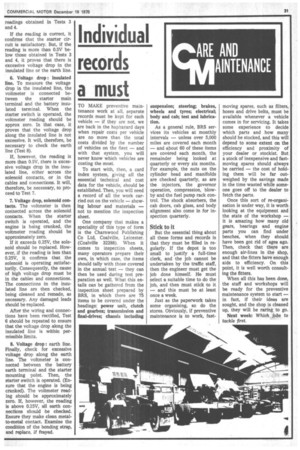Individual records a must
Page 33

If you've noticed an error in this article please click here to report it so we can fix it.
TO MAKE preventive maintenance work at .all, separate records must be kept for each vehicle — if they are not, we are back in the haphazard days when repair costs per vehicle are no more than the total costs divided by the number of vehicles on the fleet — and with that system, you will never know which vehicles are costing the most.
To start with, then, a card index system, giving all the essential technical and cost data for the vehicle, should be established. Then, you will need a record of all the work carried out on the vehicle — showing labour and materials — not to mention the inspection sheet.
One company that makes a speciality of this type of form is the Charnwood Publishing Co Ltd, Coalville, Leicester. (Coalville 32288). When it comes to inspection sheets, many operators prepare their own, in which case, the items should tally with those covered in the annual test — they can then be used during test preparation as well. What this entails can be gathered from the inspection sheet prepared by BRS, in which there are 75 items to be covered under the headings: power unit, clutch and gearbox; transmission and final-drives; chassis including suspension; steering; brakes, wheels and tyres; electrical; body and cab; test and lubrication.
As a general rule, BRS services its vehicles at monthly intervals — unless over 5,000 miles are covered each month — and about 60 of these items are covered each month, the remainder being looked at quarterly or every six months. For example, the nuts on the cylinder head and manifolds are checked quarterly, as are the injectors, the governor operation, compression, blowby and the fuel pump rack control. The shock absorbers, the cab doors, cab glass, and body alignment also come in for inspection quarterly.
Stick to it But the essential thing about all these forms and records is that they must be filled in regularly. If the depot is too small to justify a full-time clerk, and the job cannot he undertaken by the traffic staff, then the engineer must get the job done himself. He must select a suitable time to do the job, and then must stick to it — •and this must be at least once a week.
Just as the paperwork takes some organising, so do the stores. Obviously, if preventive maintenance is to work, fast moving spares, such as filters, hoses and drive belts, must be available whenever a vehicle comes in for servicing. It takes some experience to decide which parts and how many should be stocked, and this will depend to some extent on the efficiency and proximity of your dealer or stockist. But a stock of inexpensive and fastmoving spares should always be carried — the cost of holding them will be far outweighed by the savings made in the time wasted while someone goes off to the dealer to fetch the parts.
Once this sort of re-organisation is under way, it is worth looking at the equipment and the state of the workshop — it is amazing how many old gears, bearings and engine parts you can find under benches, when they should have been got rid of ages ago. Then, check that there are enough air-lines in the shop, and that the fitters have enough aids to efficiency. On this point, it is well worth consulting the fitters.
When all this has been done, the staff and workshops will be ready for the preventive maintenance system to start — in fact, if their ideas are sought, and the shop is cleaned up, they will be raring to go.
Next week: Which jobs to tackle first.












































































